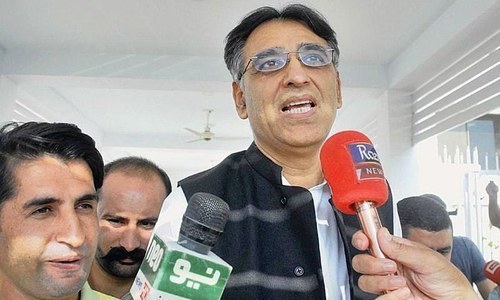THE decision to approach the International Monetary Fund provided comfort to economic stakeholders as the prospective bail-out package will help Pakistan dodge the immediate danger of a sovereign default. It is not expected, however, to automatically solve all problems weighing on future economic prospects.
A major challenge would be to contain the fallout of the economic slowdown on households and investors. The petrol, gas and electricity rate hike and their multiplier effect will significantly jack up cost of living and doing business. The slowdown has shrunk trading volumes in the market. Many brokerage houses, trading firms and mutual funds have already started cutting corners and firing staff on the fringes.
During a recent interaction with top businessmen in Karachi, Razak Dawood, advisor to the prime minister for commerce, articulated what he termed the major economic challenge. “Stopping deindustrialisation, which is an onerous task but not impossible. The industrial base needs to be reinvigorated. The government has focused itself on a doable export-led growth strategy and is working to remove duties for all imported raw material.”
“Sure. The million dollar question is: where is the new investment is going to come from?” commented a big gun privately.
Austerity measures, tightening of the monetary policy, falling rupee dollar parity, upward revisions of utility rates and the growing wedge of confidence between the private sector and the government mean more challenging private investment prospects going forward.
No one in business circles expects the cash starved and debt ridden government, with a harsh lender breathing heavy on its neck to invest liberally in the current phase. At the same time it would be absurd to assume that the private sector can be mobilised unless it finds the activity sufficiently safe and financially rewarding.
The fact is that the risk-averse private sector did not respond when the past governments attempted to expand the base of the economy by offering a low credit cost environment unless returns were guaranteed.
The current economic downturn, reflected in depressing trends in capital, currency, commodity, retail and property markets, are symptomatic of a deeper malice. The indecisiveness of the ruling party, since it assumed power two months back, played a part in exposing the fact but even ardent supporters of the last PML-N government will not refute that the high growth it achieved was not well grounded.
Some businessmen, economists and officials were approached to pick their mind on the crucial step, in their opinion, that can steer the economy out of this tight corner. The responses were swift but reflected a lack of consensus in the relevant circles.
Mr Salim Raza, former governor, State Bank of Pakistan, responded in writing. “Setting the right agricultural choices is important. We have to subsidise wheat and sugar exports because of a production surplus. To this end the government set rates above world prices.” He advocated that land surplus be diverted to edible oil crops (rapeseed, canola, mustard, etc), which have been taken over by sugarcane and wheat, to curtail edible oil imports.
Mr Shaukat Tarin, former finance minister, admitted that there is no single ‘ready’ solution. “It is most important that we all start paying taxes judiciously,” he says.
Mr Muhammad Ali Tabba, chairman, the Pakistan Business Council and CEO Lucky Cement said that “the country needs expansion of tax base and an increase in exports.”
A senior official admitted that under the IMF’s guardianship growth will suffer in the short run. “In the medium- to long-term the only way out is to excite the private sector to invest in Pakistan. These non-debt creating financial flows will ease out the stringent balance of payments situation. This is possible through orderly, business-friendly structural reforms besides changing the bureaucratic mindset,” he said.
“I would recommend tariff and trade policy reforms to get exports moving. That’s what India did after their bailout in 1992. Nothing else will work. Other options include substantially reducing the defence expenditure and privatising state owned enterprises,” opined Dr Manzoor Ahmad, former Pakistan ambassador to the World Trade Organisation.
Shabir Ahmed, chairman Pakistan Bed Linen Manufacturers and Exporters Association wanted the government to focus on the economy. “Stop the witch hunt. The FIA involvement is scaring overseas joint venture partners”, he said. Terming public name calling of suspected tax evaders irresponsible he thought that the PTI is punishing the business class for its own failings (being ill prepared to deal with challenges on hand).
“Zero duties and taxes on import of machinery plus loans for plant upgradation machinery on a rate permissible under the export finance scheme can help,” responded Majyd Aziz, president Employers Federation of Pakistan.
Eizaz Sheikh, president Cement Manufacturers Association of Pakistan advised reducing imports and stay away from meddling in the housing construction business to avoid financial scandals.
Published in Dawn, The Business and Finance Weekly, October 15th, 2018

















































